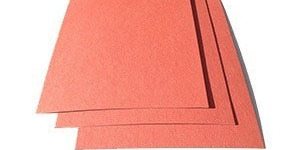Vulcanised Fibre Jointing
Vulcanised Fibre offers an excellent mechanical strength and stability, lighter in weight in comparison to aluminum and compared to other plastics, is more environmentally friendly to manufacture as it contains fewer chemicals and artificial binding agents. Vulcanized fibre can withstand exposure to a variety of chemical solvents, oils, and grease without degrading and work between the temperatures of -40℃-100℃. Available in commercial, electrical and even WRAS approved grades, Vulcanised Fibre can be found used to create gaskets, washers for taps, and even found within electrical motors, home appliances and hand tools.

Material Enquiry
For information on Vulcanised Fibre Jointing please complete the following quick enquiry or call us on +44(0)1384 252555.
Specification & Key Characteristics
- Colour: red, grey, black
- Sheet Sizes: 1m x 1m or 2m x 1m
- Thicknesses: 0.5mm to 3mm
- Grades: commercial, Electrical and WRAS grade
- Temperature range: -40℃-100℃
- Resistances: chemical solvents, oils, grease, wear, fatigue and impact
Help and guidance
If you would like to speak to a representative to discuss your specific application or requirements please call our sales office direct on 01384 469100, alternatively you can send an E-mail. Simply click on the link and forward us your details along with your question and we will contact you immediately.
Samples - Technical Vulcanised Fibre Jointing
Samples can be submitted for testing upon request.
Call now for sample requests or further help.
What is Vulcanised Fibre Jointing?
Vulcanised Fibre is manufactured using a blend of fibrous materials such as wood pulp, paper and cotton which are passed through a zinc-chloride solution or sulphuric acid and heat treated, which causes the fibres to partially dissolve and bond under compression without the need for any bonding agents, creating a tough, resilient material, which lightweight and stiffer than most thermoplastics
Why use Vulcanised Fibre Jointing?
Vulcanised Fibre offers an excellent mechanical strength and stability, lighter in weight in comparison to aluminium and compared to other plastics, is more environmentally friendly to manufacture as it contains fewer chemicals and artificial binding agents.
Vulcanized fibre can withstand exposure to a variety of chemical solvents, oils, and grease without degrading and work between the temperatures of -40℃-100℃. Available in commercial, electrical and even WRAS approved grades, Vulcanised Fibre can be found used to create gaskets, washers for taps, and even found within electrical motors, home appliances and hand tools.
What can be used as an alternative to Vulcanised Fibre?
Elephantide - a pressed paper, recognised by its blue colour as it’s manufactured using blue cotton, suitable for low voltage insulation to insulate electrically hot items.
NOMEX - is a synthetic aromatic polyamide polymer that provides high levels of electrical, chemical and mechanical integrity over a wide range of temperatures. Nomex offers chemical resistance to acids, alkalis, solvents and radiation, can be used with oils, resins, adhesives, refrigerants and is self-extinguishing
VALOX - a flame retardant film, tested to UL94 VTM-0 which has very high compressive and dielectric strengths, very low water absorption, excellent dimensional stability and good chemical resistance. As it doesn't contain plasticisers it will not become brittle with age under normal conditions.
The Benefits of using Vulcanised Fibre Jointing
- Temperature range of -40℃-100℃
- Resistant to chemical solvents, oils and grease
- Available in commercial, Electrical and WRAS grades
- high mechanical strength and dielectric properties
- Excellent anti-static and ageing properties
- Good resistance to wear, fatigue and impact
Advantages of using Vulcanised Fibre?
There are many advantages to using Vulcanised Fibre, it is manufactured in an environmentally friendlier way and in return doesn’t expose users to as many chemicals and can be used in direct contact with metals without causing corrosion.
As Vulcanised Fibre is available in a range of grades, it is highly versatile in the number of applications it can be used, from sealing washers in taps to components in electrical equipment, it also offers resistance to chemical solvents, oils and grease exposure and is mechanically very strong so will not break or tear during use - unless the max temperature is exceeded which may cause burns or if used in very wet or humid conditions.
Other advantages of using Vulcanised Fibre include it’s resistance to wear, fatigue and impact, so often used as abrasion resistance pads, it has a wide working temperature range of -40℃-100℃ and often utilised in machinery, railway and aerospace industries.
Please contact us using the form below or by calling us on +44(0)1384 252555.





















